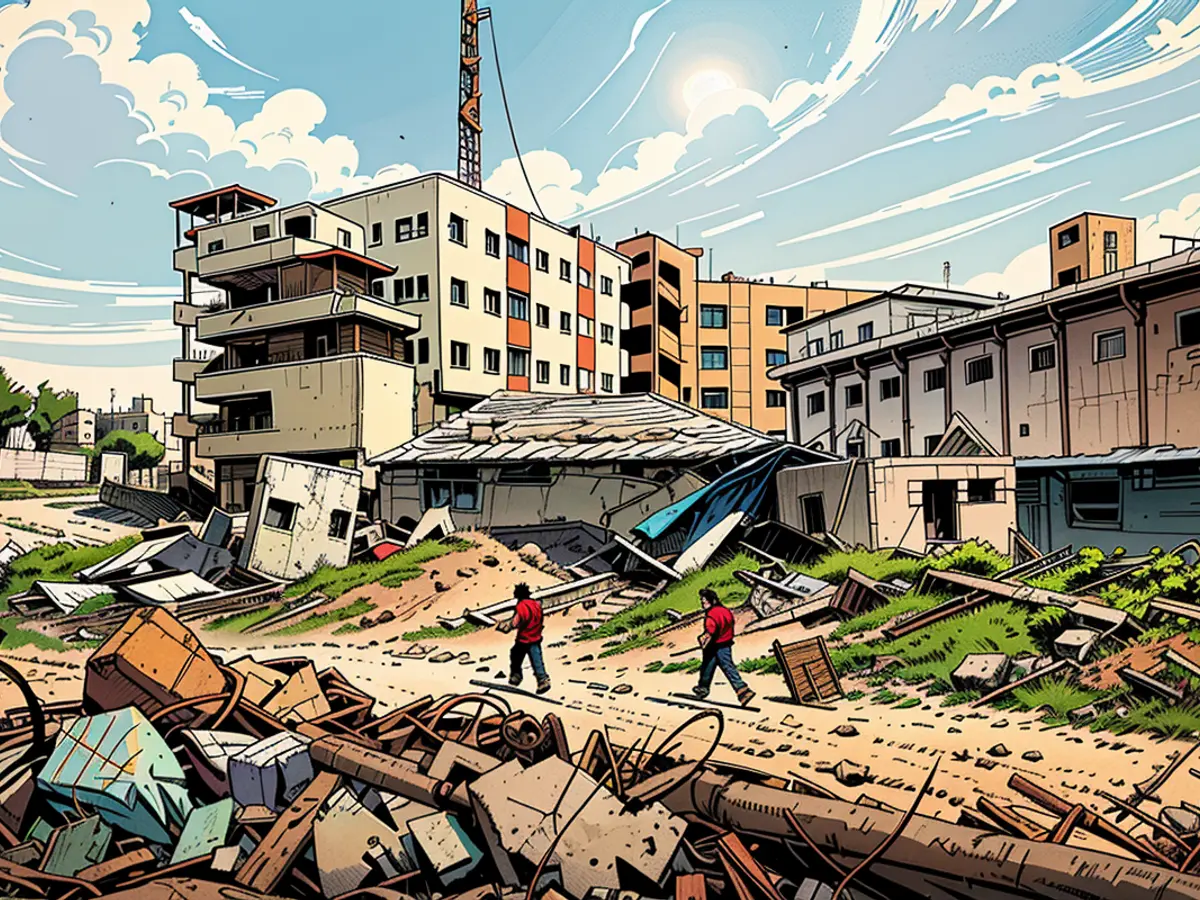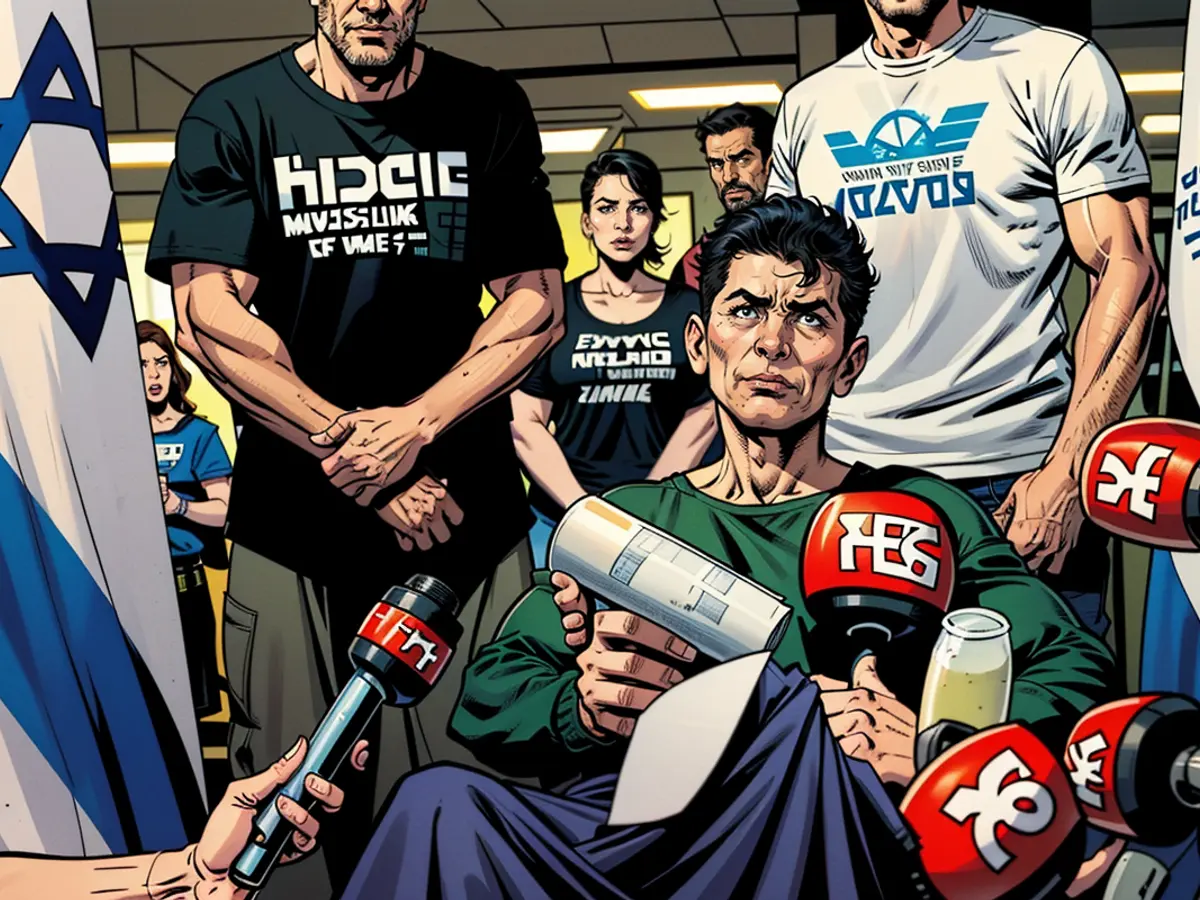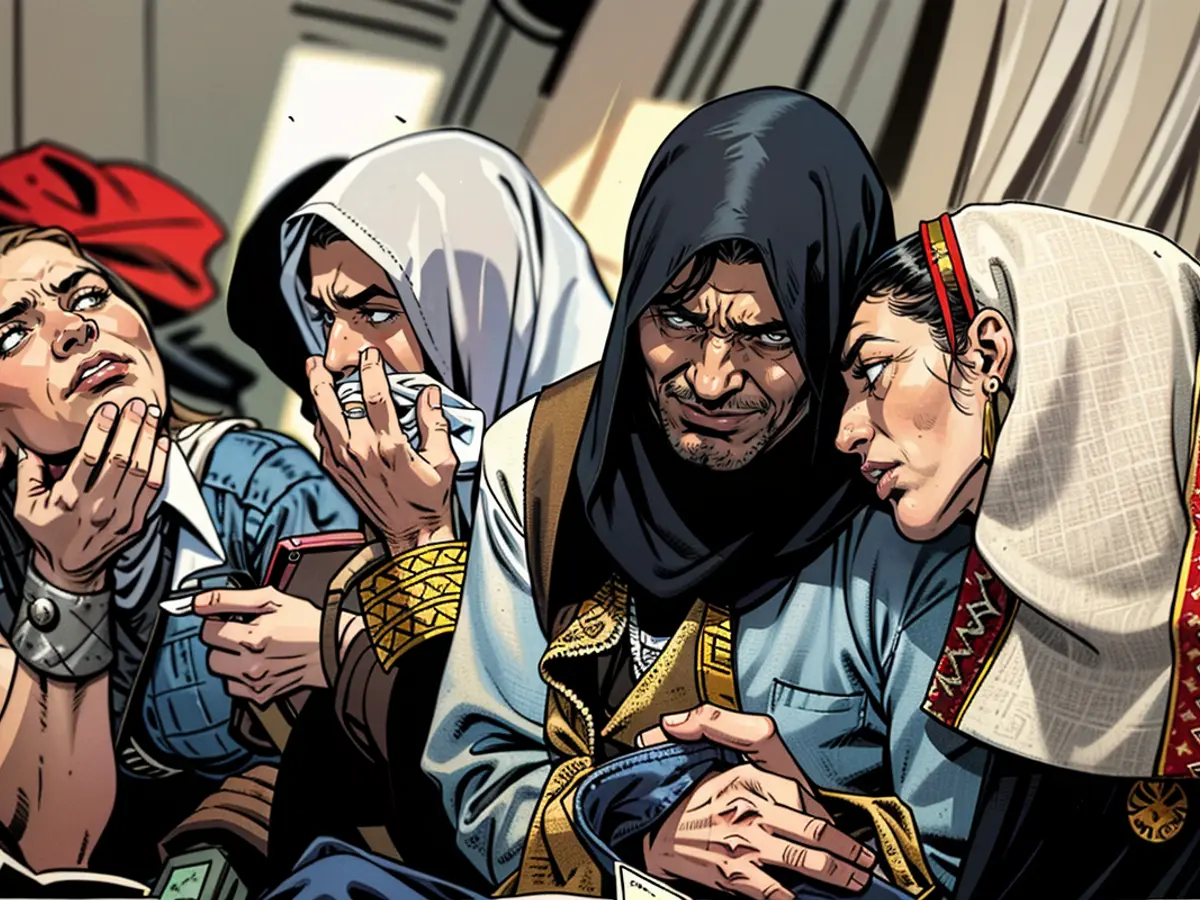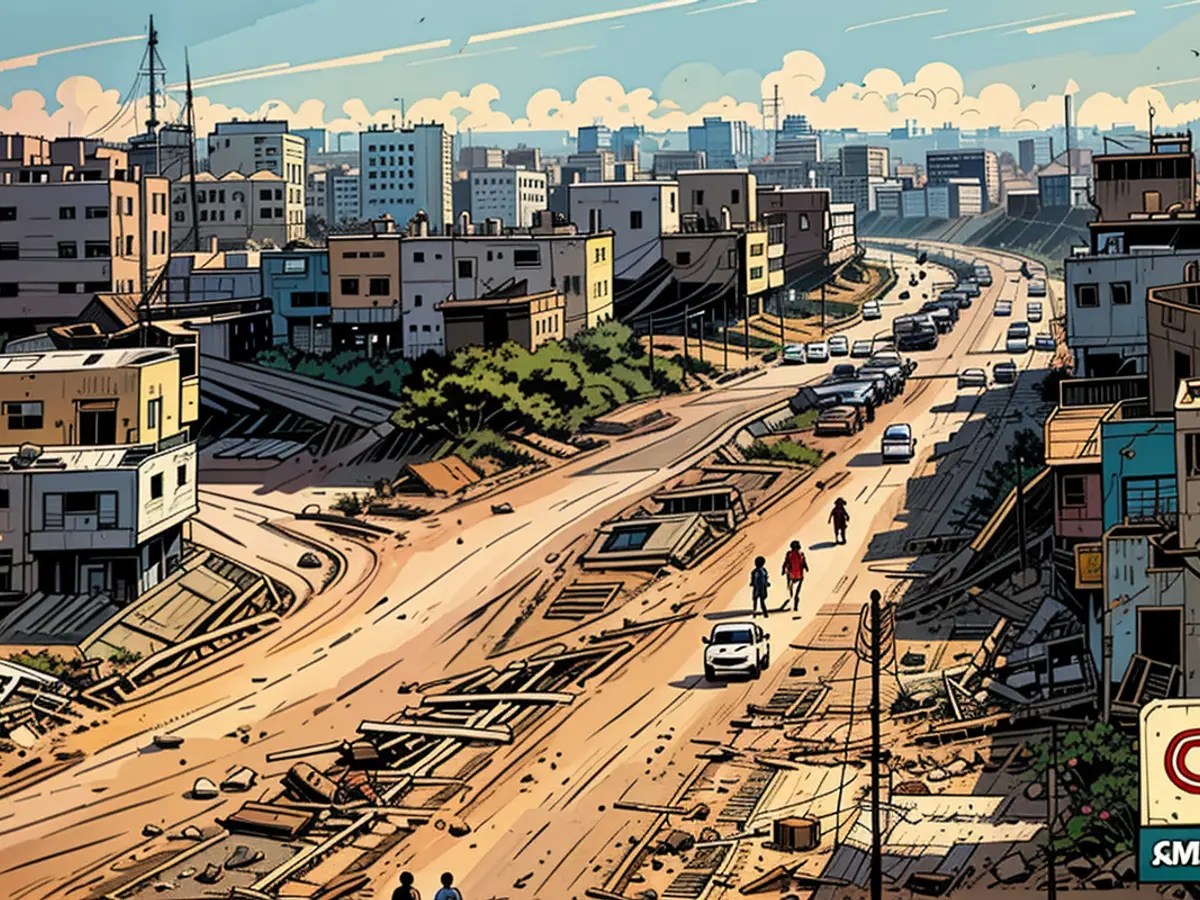Parent in Gaza with an ailing child and individual in Israel held as captive advocate for truce agreement
Meanwhile, 84-year-old Oded Lifschitz, who was snatched from his home in Kibbutz Nir Oz on October 7 of the previous year by Hamas extremists, continues to be imprisoned within the encampment. His family remains persistent in their attempts to secure his release.
The narratives of two lives, those of a Palestinian youngster and a senior Israeli gent, serve as a grim testament to the countless lives of the innocent ensnared in a conflict they hadn't chosen. Their fates have become entwined in political discussions and negotiations that appear to have reached a deadlock.
The child, Jihad, is battling to breathe or eat. His mother, Tamara, strives to comfort him as he cries and writhes, with tubes protruding from his mouth and nose.
Much like thousands of other patients in Gaza, he urgently requires foreign medical treatment, but these transfers have significantly diminished since May, when Israel assumed control over the Rafah border crossing.
Israeli authorities have only approved the departure of a negligible portion of the estimated 12,000 Palestinians - including many youngsters - awaiting transfer for treatment.
Over a year of Israeli raids and the corresponding siege of the enclave have left the healthcare sector in shambles. Medical professionals are left with minimal resources to save lives. Hospitals are overburdened with casualties from the conflict, but they now also deal with a surge of preventable diseases spreading rapidly.
In August, an 11-month-old infant registered as the first afflicted with polio in Gaza within 25 years, following Israel's military campaign that damaged the region's water supply and sanitation facilities.
Subsequently, the World Health Organization administered the primer dose of the polio vaccine to more than half a million children under 10 in Gaza, with the second round of the emergency vaccination drive currently underway, according to UNICEF. Unfortunately, UNICEF had to cancel vaccinations at a school serving as a displacement shelter due to damage inflicted by an Israeli air strike.
And countless others, like Jihad, continue to suffer from serious ailments, chronic illnesses, and cancer, receiving inadequate treatment in Gaza.
Doctors at Gaza's Nasser Hospital explained that neither the expertise nor the necessary equipment were available to diagnose and treat Jihad appropriately, hence their decision to carry out surgery to eliminate the tumor and alleviate the burden on his heart, despite the risks.
Speaking to CNN before her son's operation, Al-Maarouf struggled to contain her tears, imploring the world community for aid.

“These are children, they don't carry weapons,” she told CNN. “Why can't he be evacuated?”
Against all odds, Jihad managed to survive the surgery. However, doctors were regrettably unable to remove the tumor entirely; his mother shared this information with CNN last week. A month after the operation, Jihad continued to battle weight loss, diarrhea, fever, and lack of appetite, she reported.
Thousands of miles away, within her London home, Sharone Lifschitz perused black-and-white photos saved on her phone as she interacted with CNN last month. Her smile radiated as she pointed to a photograph of her mother, Yocheved Lifschitz, featuring a Hebrew sign that translates to "Shalom," or peace.
Her parents had been vocal advocates for peace. In recent years, the elderly couple had teamed up with Israeli volunteers who would ferry Gazans to hospitals in East Jerusalem and the West Bank for medical treatment. Her father, Oded Lifschitz, held onto his driver's license to continue these missions, she mentioned.
“My father believed in thinking big and resolving difficult problems... He was very much for the two-state solution,” Lifschitz told CNN. “He believed we could reach agreements with the Palestinians.”
The harrowing morning of October 7 saw Oded and Yocheved apprehended from their home in Kibbutz Nir Oz, a location that had witnessed one of Hamas's most brutal attacks on that day.
Yocheved, now 86, was abducted while still in her nightgown, thrown onto the back of a motorcycle and driven off to Gaza. Towards the end of October, Hamas formally released her upon humanitarian grounds.
Since then, the last time Yocheved saw her husband of over 60 years was on October 7, 2020. On that fateful day, he lay on the ground, wounded after being shot by the militants who had stormed their residential complex.
“He survived and his spirit survived,” their daughter shared with CNN. “We know he searched for my mom on the first day,” she cited, referring to testimonials from former hostages. “We know that he aided the other hostages he shared a room with. My father was a generous, kind, and compassionate man.”
These qualities of compassion and generosity, as well as his ability to communicate in Arabic, are qualities that the family hopes will have seen him through his ordeal.

They have now been waiting for his return for over a year. Seemingly unfazed, Oded celebrated his 84th birthday in Hamas captivity in May.
Lifschitz wears a dog tag adorned with her father's image and the number 84, as well as the inscription, "Patiently waiting for you at home."
“Hamas took elderly, elderly individuals; they didn't need them, and they could have returned them without a deal,” Lifschitz stated. “There is no deal needed to return an 84-year-old man. There is no deal needed to return a 1-year-old baby. The fact that Hamas is using them to reach a deal is appalling.”
But Lifshitz, much like numerous other Israelis, still believes the only way to escape this nightmare is through a negotiation between Israel and Hamas, resulting in a ceasefire and the liberation of the hostages.
She's concerned they're running out of time to bring them back alive and safe.
"We're utterly drained and heartbroken, over and over again," Sharone stated. "We're not giving up. We can't afford to give up."
Negotiations towards a ceasefire and hostage release deal have repeatedly broken down, with both Israel and Hamas accusing each other of being the main cause of the failures. As a result, international mediators from the United States, Qatar, and Egypt have struggled to revive talks that have remained at a standstill for months.
In July, a deal seemed almost imminent, but CNN sources report that last-minute Israeli Prime Minister Benjamin Netanyahu's demands wrecked the agreement and created barriers to a compromise. The US subsequently faulted both Israel and Hamas for introducing conditions that have led to a stalemate in negotiations. The families of hostages have long accused Netanyahu of deliberately prolonging the conflict and sabotaging negotiation opportunities for his political gain.
At stake are the lives of more than 100 Israeli hostages and over 2.2 million Gaza residents, confined in a blockaded territory that has become a "living hell," according to aid organizations who have been urging for a ceasefire to save lives.
Survivors of Israel's bombardment, which has claimed over 42,000 lives according to Palestinian authorities, face a slow and agonizing death under siege, with conditions deteriorating rapidly.

"He's an innocent child who bears no responsibility for what's happening," a distressed mother told CNN last month. "What did a 4-month-old ever do?"
Lifschitz believes the mediators should do more to secure an agreement. She'd like Egypt and Qatar to exert more pressure on Hamas, but in her opinion, it's US President Joe Biden who has the power to make a deal happen.
"I believe it's President Biden who has the power and responsibility to bring them home at this very moment... I believe he's our best hope," she said.
Lifschitz declines to compare her government's position to Hamas, but claimed: "History has seen countless individuals trapped in the currents of time, swept away by political and military fanatical regimes prioritizing their own agendas over human lives... Both nations are currently burdened with leaders who aren't serving their best interests."
The urgency of the situation for Israeli families intensified in early September, following the Israeli military's retrieval of the bodies of six hostages executed by Hamas.
The Israel Defense Forces (IDF) stated that the hostages had been "brutally" murdered "just before Israeli troops could reach them." Hamas, in response, issued a chilling warning that additional hostages would return in coffins if Israeli forces attempted to rescue them.
Three of these six hostages were anticipated to be freed as part of a future ceasefire agreement, Israeli officials informed CNN.
These were young individuals who had every opportunity to survive and had done so for almost a year, Lifschitz expressed, tears in her eyes. "It's a failure; we've let them down."
Hostage families worry not only about the safety of their loved ones at the hands of their captors, but also due to Israeli military operations, including the persistent bombardment that has flattened much of Gaza.
Last month, the IDF confirmed that three hostages whose bodies had been found in December were "most likely" killed in an Israeli strike. The military had previously admitted to mistakenly "shooting and killing" three other hostages the previous year and was currently investigating the circumstances of the "deaths of six hostages" whose bodies had been discovered in June.

While chances of an agreement seem grim, Lifschitz vows never to stop fighting for the release of her father and the other hostages.
Asked what she'd tell her father if he could hear her, Lifschitz replied, emotionally choked up, "Forgive us. Forgive us. We've tried so hard. And know that we hear your voice in our heads... You always said, 'Work for peace, work for the possibility of humans in this region to live together.'"
Despite the ongoing political deadlock, efforts to secure medical treatment for Palestinian children like Jihad in the Middle East continue to be impeded. The World Health Organization has administered vaccinations in Gaza, but the situation remains dire as thousands of patients require foreign medical treatment. Meanwhile, the world's attention should also be directed toward the elderly Israeli hostage Oded Lifschitz, who has been imprisoned in the Gaza Strip for over a year.







